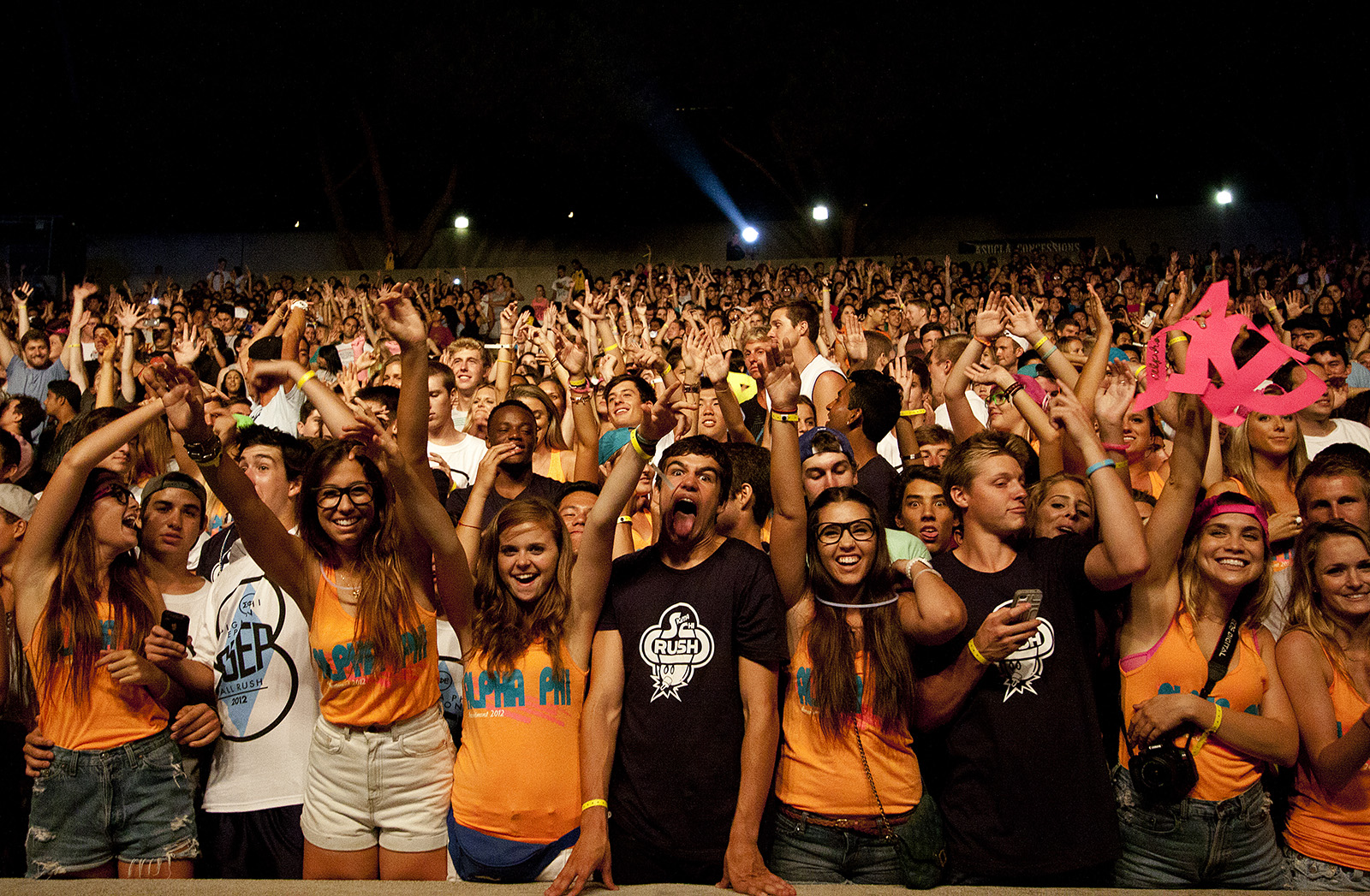Sandra Wenceslao: Music shows should employ help centers for audience mental safety

Concerts and music shows, such as Bruin Bash, need to not only provide for audience members’ physical needs but also their mental health needs through hot-lines and help centers. (Daily Bruin file photo)
By Sandra Wenceslao
Sept. 21, 2016 11:33 p.m.
Most people expect a free-flowing environment and a couple hours reprieve at a concert. However, in the case of Darshika Kumar, a second-year psychobiology student, her experience was far from the easy-going reprieve she was expecting. At a Black Veil Brides show at The Warfield venue in San Francisco, an intoxicated audience member threatened her sense of safety and well-being. Although the physical menace was somewhat distant, the specter of facing a violent situation loomed large in her mind throughout the show.
It’s a reasonable feeling. Physical altercations don’t just harm the people directly involved, but also those who witness them. It can cause impending fear among many concertgoers, or it may go even further and trigger in anxiety and panic attacks.
In fact, physical and mental security go hand in hand in most situations, especially concerts and festivals. They should both be guaranteed in every music event, whether it’s for a pop artist or heavy metal group.
And yet, that’s not always the case. In June, Christina Grimmie was killed during a meet-and-greet she held after her concert. At the HARD Summer rave this summer, three attendees died at the weekend-long festival, including a UCLA student. And there were 89 deaths in Paris’ Bataclan venue during an Eagles of Death Metal show last November. These incidents have not only threatened physical security but also left a tattered sense of mental security among concertgoers.
There’s been growing concern over physical safety, but mental safety is often overlooked. Caring for attendees’ mental safety means making them feel comfortable in the space provided to them for the couple of hours they’re there. They’ll be able to enjoy the show without any serious fear of an anxiety or panic attacks brought on by the intense environment.
[Read more: Preventing more tragedy following HARD Summer Music Festival deaths]
And while the focus on the physical aspect is all well and good, mental safety should be equally as important – but little is done to enforce mental safety during music events. With large crowds comes little to no personal space, which can easily trigger an onslaught of feelings for people that battle mental health disorders such as anxiety. And with cramped space in a crowd, constant movement and pressing of bodies, people run the risk of being sexually assaulted, which can easily go undetected by those around you. In the past couple of months alone, two festivals in Sweden have faced over 40 reports of sexual assault. That doesn’t just make concertgoers uncomfortable, but also exposes them to long-term effects that come with sexual assault, such as post-traumatic stress disorder and depression.
By having first response, or some form of aid, the effects of a traumatic event would hopefully lessen. Also, if it becomes common knowledge that shows are not just physically safe, but also mentally safe, more people may feel comfortable enough to attend.
The responsibility falls onto the show organizers like artists and venue staff because some situations require more than a glance or warning to reassure a crowd they’re safe. Staff can misunderstand the severity of someone’s panic attack or anxiety episode in the chaos of a concert crowd. These incidents can be easier to dismiss, but that doesn’t make them any less valid. If someone is seeking help from security, they should get it.
It would also be in the best interests of venue owners because they could lose a lot of business if they developed a reputation for not caring about fans’ safety. The same goes for the artists because they can easily lose fans that attend live shows once they notice that their regular crowds are deemed unsafe. Fans tend to flock toward artists that care and speak up about their safety in and out of shows.
[Read more: Harm reduction would prevent drug-related deaths at raves]
Show organizers can prevent physical and mental threats from escalating with the creation of hotlines and help centers. Help centers can have someone on standby who can help audience members with non-physical injuries such as ongoing mental issues caused by traumatic experiences and anxiety attacks. The help centers should have volunteers and workers trained to deal with audience members who have experienced a traumatizing event at the show.
Some groups are already taking the initiative in concert safety. The pop-punk band Modern Baseball is doing their part in improving concert safety by following the footsteps of the bands Speedy Ortiz and PWR BTTM. They established a hotline for one of their most recent tours. Modern Baseball created an animated video that gives their fans a run-through of the program. The video encourages attendees to text or call the given number any time they feel unsafe during the show. This will instantly alert the manager and, ultimately, the security. They let their fans know of the newly established resource multiple times through social media. Efforts such as these should be replicated and adopted by more artists and venues.
But despite its effectiveness, this system is not usually seen at events, and even when it is, concertgoers may not know about it. Effective advertising can work wonders for hotlines and help centers and overall mental safety.
It’s needed. Hotlines and help centers are the only way to ensure that everyone is enjoying their time away from the real world. It will ensure that not only will they go back home unscathed, but also that the artist cares enough about them to set up resources that will ensure a memorable, uninterrupted concert experience.
Concerts and festivals should send you home with a smile on your face and at worst, a bad sunburn – not any lasting physical or mental trauma.


